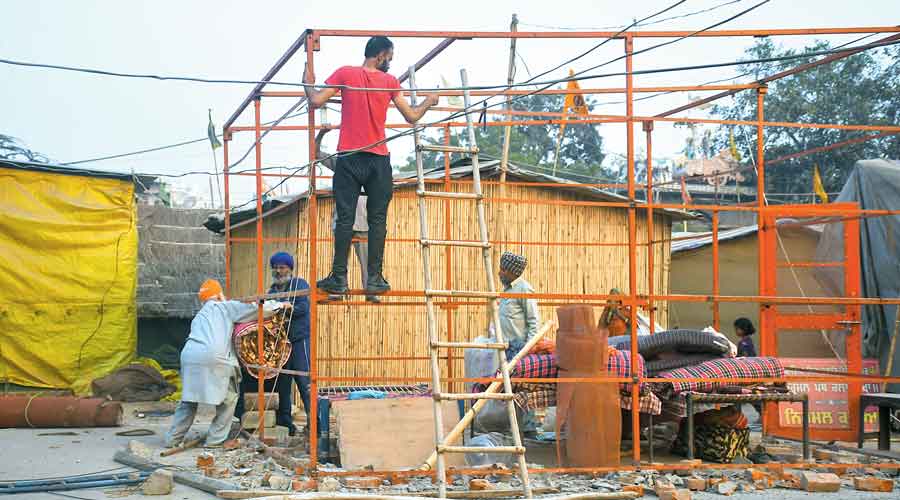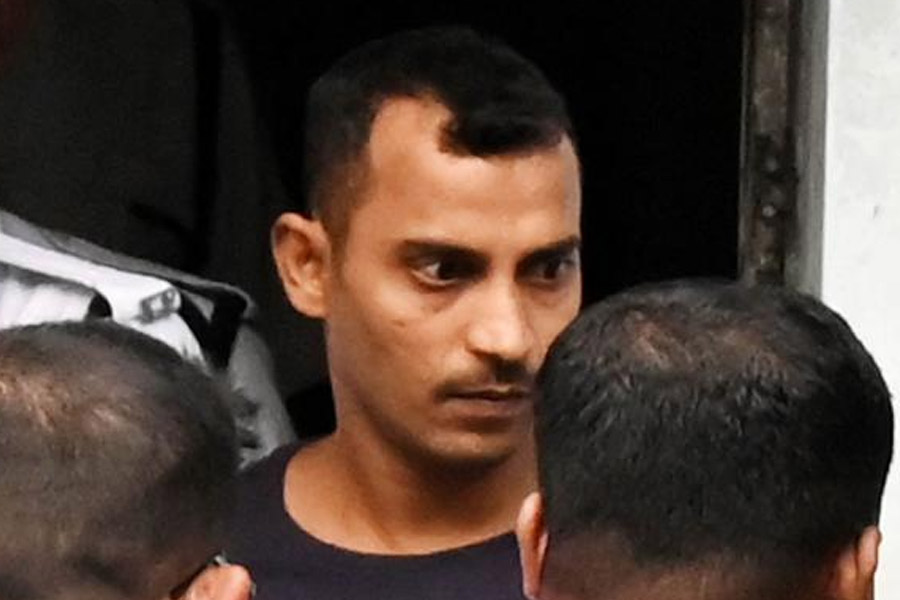For over a year, a 2,400sqft tent at the Singhu border was home to Gurinder Singh, Butta Singh Shadipur and fellow villagers as they protested against three farm laws.
On Friday the two friends pulled down this pavilion of protest but said they planned to rebuild it at their village, in Punjab’s Bathinda district, to keep the memories of the movement alive.
As the farmers prepare to leave the protest sites on Delhi’s borders on Saturday, the government having repealed the contentious laws, many say they will reinstall their tents in their villages as emblems of their long, arduous struggle.
When Gurinder, Butta and 500 others from Ram Nawas village arrived at the Singhu border on November 26 last year, they had to unroll mattresses on the floor and sleep under open skies in the cold.
Over the next few months, Gurinder and Butta built a makeshift structure that has three rooms, a bathroom and a meeting area, together measuring 2,400sqft.
They used bamboo for partitions and a tin sheet for roof. Around 70-80 people would sleep in the meeting area and the three rooms every night.
They then brought in a television set, a cooler, a gas stove and a small fridge — everything they needed for a comfortable stay as the protesters buckled down for the long haul.
“We spent around Rs 4.5 lakh on this structure. Now we plan to shift it to our village and rebuild it,” Gurinder said.
Butta said the structure would also serve as a memorial to those who died during the agitation.
“We will keep some of our pictures in it to remind us of the time spent here,” he added, recalling the initial days of the movement when the farmers faced tear gas shells, water cannons and batons.
Bakshish Singh, who managed a 10-bed “Kisan Mazdoor Ekta Hospital” at the protest site, rode a wave of conflicting emotions as he pondered the end of the agitation. The smiles and hugs hide the pain of parting, he said.
The 30-year-old from Patiala said the Life Care Foundation-run makeshift hospital had begun with one stool and a small cache of medicines to control sugar and blood pressure. “We scaled it up seeing that a large number of farmers, especially the elderly, had some health issue or the other,” Bakshish said.
The hospital recorded more than 1 lakh OPD visits over the past one year, with residents of the locality accounting for more than half of them, doctors said.
Free diagnostic tests were conducted at the facility for dengue, malaria, chikungunya, typhoid and other diseases.
“We got a lot of cases of heart attack and seizure. I can say the number of deaths during the protest would have been higher had the hospital not been there,” Bakshish said.
The Life Care Foundation now plans to shift the hospital near Jalandhar to provide free medical treatment.
“We will take it down and reassemble it. A part of the hospital will be converted into a museum with pictures and records of the people treated during the protest,” Bakshish said.
The Samyukta Kisan Morcha, a forum of 40 farmer unions that led the protests, had on Thursday announced that the agitation would be suspended and the farmers would leave for home in victory processions on Saturday.
Jarnail Singh from Mohali said he had helped build two temporary structures with bamboo and tarpaulin for around 500 people from 12 villages.
“It cost us Rs 4 lakh — Rs 2 lakh for either structure. Everybody contributed something: inverter batteries, air conditioners, television — we had everything,” he said as he climbed a ladder to take the tarpaulin off.
Jarnail and others now plan to reassemble the structure in Buta Singh Wala village. “We will plant a lot of flowers around the structure, make it more beautiful. We will also park at the site one of the tractors in which we drove to Delhi,” he said.
Sardar Gurmukh Singh of the Bharatiya Kisan Union (Doaba) had built a three-room structure with bricks and cement mortar in March. At least five people have been working non-stop since Friday morning to dismantle it.
Ladders, tarpaulin, poles and ropes lay scattered at the Singhu protest site on Friday as young and elderly farmers joined hands to dismantle tents, bundle up their belongings and load them onto trucks.
Cardboard, thermocol, iron wire mesh, PVC sheets and mosquito nets were strewn everywhere.
Jassa Singh, 69, a farmer from Faridkot in Punjab, said: “More men means it will be over quickly. We had ample time to build them, but we leave tomorrow. Hence the haste.... I have eaten a lot of ghee in my life: my muscles are as good as those of a 30-year-old.”
As the men bundled up the clothes and mattresses and swiftly loaded them onto the trucks, women prepared lunch.
“The gas stoves and the utensils will be packed last. We still have to cook dinner and tomorrow’s breakfast,” said Mai Kaur, 61, from Jalandhar in Punjab as the women prepared lunch.
The youngsters were inspecting the tractors and cleaning the trolleys in preparation for the journey back home. They were stopping to have lunch or tea or a snack and straightaway returning to work.










